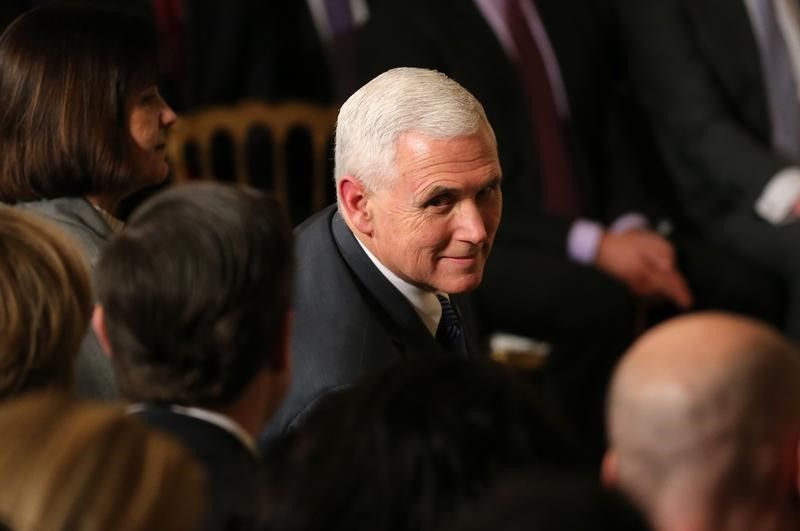
U.S. Vice President Mike Pence on Sunday defended President Donald Trump's attack on a federal judge who blocked a travel ban on citizens of seven mainly Muslim nations, as the first major legal battle of the Trump administration intensified.
The new Republican president blasted U.S. District Judge James Robart as a "so-called judge" on Saturday, a day after the jurist in Seattle issued a temporary restraining order on the ban. A U.S. appeals court later on Saturday denied the government's request for an immediate stay of the ruling.
"The president of the United States has every right to criticize the other two branches of government," Pence said on NBC's program "Meet the Press."
It is unusual for a sitting president to attack a member of the judiciary, which the U.S. Constitution designates as a check on the power of the executive branch and Congress.
U.S. Senator Patrick Leahy, the ranking Democrat on the Senate Judiciary Committee, said Trump seems intent on precipitating a constitutional crisis. Some Republicans also expressed discomfort with the situation.
"I think it is best not to single out judges for criticism," Senate Majority Leader Mitch McConnell said on CNN's "State of the Union" program. "We all get disappointed from time to time at the outcome in courts on things that we care about. But I think it is best to avoid criticizing judges individually."
Republican Senator Ben Sasse, a vocal critic of Trump, was less restrained.
"We don't have so-called judges...we don't have so-called presidents, we have people from three different branches of government who take an oath to uphold and defend the Constitution," he said on ABC News program "This Week."
The ruling by Robart, appointed by former Republican President George W. Bush, along with the decision by the 9th U.S. Circuit Court of Appeals in San Francisco to deny the government's request for an immediate stay dealt a blow to Trump barely two weeks into his presidency.
It could also be the precursor to months of legal challenges to Trump's push to clamp down on immigration, including through the construction of a wall on the U.S.-Mexican border.
The businessman-turned-politician, who during his presidential campaign called for a temporary ban on Muslims entering the United States, has vowed to reinstate the travel ban on citizens from Iran, Iraq, Libya, Somalia, Sudan, Syria and Yemen and a 120-day bar on all refugees.
He says the measures are needed to protect the United States from Islamist militants. Critics say they are unjustified and discriminatory.
'We'll win'
The legal limbo will prevail at least until the 9th U.S. Circuit Court of Appeals rules on the government's application for a stay of Robart's ruling. The court was awaiting further submissions from the states of Washington and Minnesota on Sunday, and from the government on Monday.
The uncertainty has created what may be a short-lived opportunity for travelers from the seven affected countries to get into the United States.
In his ruling on Friday, Robart questioned the use of the Sept. 11, 2001 attacks on the United States as a justification for the ban, saying no attacks had been carried out on U.S. soil by individuals from the seven affected countries since then.
For Trump's order to be constitutional, Robart said, it had to be "based in fact, as opposed to fiction."
In a series of tweets on Saturday, Trump attacked "the opinion of this so-called judge" as ridiculous. "What is our country coming to when a judge can halt a Homeland Security travel ban and anyone, even with bad intentions, can come into U.S.?" he asked.
Trump told reporters at his private Mar-a-Lago resort in Florida late on Saturday: "We'll win. For the safety of the country we'll win."
The Justice Department appeal criticized Robart's legal reasoning, saying it violated the separation of powers and stepped on the president's authority as commander-in-chief.
The appeal said the state of Washington lacked standing to challenge the order and denied that the order "favors Christians at the expense of Muslims."
Uncommon Knowledge
Newsweek is committed to challenging conventional wisdom and finding connections in the search for common ground.
Newsweek is committed to challenging conventional wisdom and finding connections in the search for common ground.
About the writer
To read how Newsweek uses AI as a newsroom tool, Click here.








